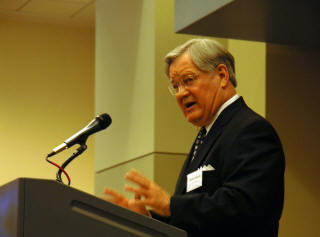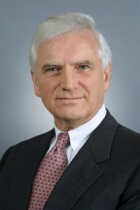|
|||||||||
|
Produced
by The Center for Baptist Studies, Mercer University Walter B. Shurden, Executive Editor, The Baptist Studies Bulletin Bruce T. Gourley, Editor, The Baptist Studies Bulletin Wil Platt, Associate Editor, The Baptist Studies Bulletin |
|||||||||
|
I Believe . . . : Walter B. Shurden "The Mercer Baptist Tradition" The Baptist Soapbox: Phil Strickland "Where
Have All the Prophets Gone?"
"10
Future Trends in the Life of Baptist Universities" "Imagine That! The Parchment Club" Baptists, the Bible, and the Poor: Charles E. Poole
"Judgment Day" "Albert Mohler on Singleness and Childlessness" Note: To print the BSB, set your printer's left and right margins to .4 inches or less.
Note: You are free
to duplicate and circulate the articles in BSB or to use quotations |
|||||||||
|
I Believe |
"The Mercer Baptist Tradition"
that most readers of The Baptist Studies Bulletin know that Mercer
University, the institution that sponsors The Center for Baptist Studies, has
been in the Baptist news recently. Much of this publicity is due to the
initiation of the Georgia Baptist Convention to discontinue the 173 year old
relationship with the University. Also, Mercer made the news when the Mercer
trustees recently elected Mr. Bill Underwood as president-elect of the
University. Underwood will follow R. Kirby Godsey, the longest serving
president in the history of the school. ● It is a tradition named for Jesse Mercer, a mostly self-educated Baptist preacher who lived during the turbulent Baptist years from 1769 to 1841. I underscore: these were TURBULENT years for Baptists in America. ● It is a tradition in which the Bible is central, even though Baptists of Jesse Mercer’s time furiously debated its meaning. Piety was a key word for Jesse Mercer. To this very day, the Christianity Department of Mercer’s College of Liberal Arts requires courses in Old Testament and New Testament, of its majors. ● It is a tradition that affirms the Christian faith and its missionary task, though some Baptists of Jesse’s day vigorously and sincerely opposed the missionary enterprise. Mercer has, over the years, made a significant contribution to the Baptist and Christian missionary enterprise. ● It is a tradition that celebrates liberal education, though Baptists of Jesse Mercer’s day were radically polarized on this subject as well. It is not different today. Some Baptists of yesterday and today have been fortunately pro-educational but tragically anti-intellectual. The Mercer Tradition is both. ● It is a tradition that encourages denominational cooperation, even creating associations and conferences and conventions through which that cooperation could occur. Some Baptists, however, made a fetish out of local church autonomy, and they opposed these new fangled structures. As one member of the Mercer community, I hope that Mercer University will create some new “dotted-line” alliances with non-fundamentalist Baptist groups. This will help us maintain The Mercer Baptist Tradition without ever again hard-wiring the school to a Baptist convention. ● It is a tradition that advocates religious liberty and freedom of conscience. Jesse Mercer wrote the section of the Georgia Constitution guaranteeing religious liberty. Kirby Godsey has been a leading Baptist advocate of intellectual freedom in our time. Bill Underwood will continue that tradition. ● It is an ecumenical tradition that encourages cooperation among all Christians, not just Baptists. I am glad that the Board of Trustees of Mercer University has non-Baptists serving on it. Serving on the presidential search committee with mostly trustees, I saw the appreciation of some of these non-Baptists for the Mercer Tradition. I would, however, like to urge the trustees to consider, if necessary, revising the charter so as to guarantee that a majority of trustees and all future presidents of Mercer University will be Baptists who are in synch with the Mercer Baptist Tradition. Likewise, I want to register that some of the best friends that the Mercer Baptist Tradition has on this campus are its non-Baptist faculty members. Would I like to see more Baptists on the Mercer faculty? You bet! But my preference is for Baptists who embrace The Mercer Baptist Tradition, not simply people who carry the brand name. ●It is a tradition that stresses God’s grace, the belief that at the heart of this universe is Cosmic Generosity. Jesse Mercer was a Calvinist who stressed God’s grace. Kirby Godsey, an unapologetic non-Calvinist, places grace at the very center of his theology. ● It is a tradition, I repeat, that refuses to let tradition freeze out the dynamics of change. It is a tradition, unsurprisingly, characterized by conflict. If you held a gun to
my head and said that I had to come up with one word to describe the Mercer
Baptist tradition, I would quickly say that the Mercer Baptist Tradition is a
Progressive Baptist Tradition. I sincerely hope that the Mercer trustees, the
Mercer administration, and the Mercer faculty will work to keep that tradition
alive and healthy. |
||||||||
|
The Baptist Soapbox: Invited guests speak up and out on things Baptist (therefore, the views expressed in this space are not necessarily those of The Baptist Studies Bulletin, though sometimes they are). Climbing upon the Soapbox this month is Phil Strickland, until recently the Executive Director of the Baptist General Convention of Texas Christian Life Commission. Phil Strickland was certainly one of the Baptist prophets. Phil died on February 11, 2006, in Texas. He gave us permission to use this piece several weeks ago, and we gladly publish it now because we requested it and also as a tribute to him. "Where
Have All the Prophets Gone?"
|
|||||||||
|
|||||||||
| Baptist Univ. |
The Baptist University in the 21st Century: This special series explores the role of Baptist universities in contemporary Baptist life, from the perspective of Baptist university presidents. This month's contributor is Thomas E. Corts, President of Samford University. "10 Future
Trends in the Life of Baptist Universities"
|
||||||||
| Local Church |
Creative Ministries in the Local Baptist Church: This series highlights local churches who are intentionally creative in their approach to ministry. This month's featured local church ministry is The Parchment Club at the First Baptist Church of Christ in Macon, Georgia. Members of The Parchment Club have been reading and discussing books for twenty years. Rick Wilson, the "Pope" of the club, is Chair of the Christianity Department at Mercer University, Macon. "Imagine That!
The Parchment Club"
|
||||||||
|
The Baptist Studies Bulletin Recommends:
“Negotiating Conflict in the Congregation” Featuring: Dr. Dennis Burton, Workshop Leader, Certified
Conflict Consultant Dr. Burton is a former North Carolina pastor, trained in Clinical Pastoral Education and certified at advanced levels by a variety of conflict training organizations, including L.E.A.D. Associates and the Lombard Mennonite Peace Center. He has served as Director of Missions for the Union Baptist Association in Monroe, North Carolina since 1994 and has led numerous workshops and served as consultant to congregations in conflict negotiation. He holds the Doctor of Ministry degree from Southeastern Baptist Theological Seminary and has completed management training programs at Wake Forest University, University of Richmond and Duke University. Workshop Registration: The program will be in the Stetson School of Business, room BE-113, from 9:30 - 3:45. To register, mail a check for $39 made out to McAfee School of Theology to: Dr. Larry McSwain, 3001 Mercer University Drive, Atlanta, GA 30341 by March 10, 2006. Registration at the door: $49. Complimentary
Presentation for Laity and Church Staff This program also features Dr. Dennis Burton, and will be held in Day Hall, Monday, March 20, 2006, from 7-9 PM. |
|||||||||
|
Baptists, the Bible, and the Poor: Charles E. Poole is a Baptist minister with Lifeshare Community Ministries in Jackson, Mississippi where he delights in ministering alongside the poor. "Chuck" Poole, a provocative preacher and servant pastor, served Baptist churches for twenty-five years. Among the churches he has served are First Baptist Church, Macon, GA, First Baptist Church, Washington, DC, and Northminster Baptist Church, Jackson, MS.
"Judgment Day"
|
|||||||||
|
"In Response To . . . Albert Mohler on Singleness
and Childlessness"
|
|||||||||
|
Dates to |
Dates to Note February 21-22, Harry Vaughan Smith Lectures, Mercer University, Macon, Georgia. Topic: "Signs of the Times: Contemporary Religion in Historical Perspective." Featured Speaker: Bill J. Leonard. Click here for more information, or contact Nancy Stubbs at (478) 301-2755 or Stubbs_NL@Mercer.edu. February 24-25, Mainstream Baptist Convocation, Richmond, Virginia. Topic: Religious Liberty in America. Featured Speakers: Welton Gaddy, Fred Anderson and Richard Groves. Click here for more information. March 3-4, Cooperative Baptist Fellowship/Georgia General Assembly, Athens, GA. Featured Speakers: Jim Dant. Click here for more information. April 17-20, 2006, Wait on the Lord, Spiritual Formation Conference, Orlando. For all clergy and lay ministers. Presented by American Baptist Churches USA More information, including registration instructions, is available online. April 21-23, 2006, Alliance of Baptists, 20th Annual Convocation, Southside Baptist Church, Birmingham, Alabama. Theme: Race: "We Have This Ministry–Reconciliation" (2 Cor. 5:18). Visit the website. May 4-5, 2006, "The University Campus: Tomorrow's Moderate Baptists." First Baptist Church, Decatur, GA. Sponsored by National Cooperative Baptist Fellowship, Cooperative Baptist Fellowship of Georgia, and The Center for Baptist Studies. For more information, click here. July 12-15, 2006, International Conference on Baptist Studies IV, Acadia University, Wolfville, Nova Scotia, Canada. The Fourth International Conference on Baptist Studies will help to mark the centennial celebrations of the Convention of Atlantic Baptist Churches. The theme is "Baptists and Mission," which includes home and foreign missions, evangelism, and social concern. For more information, contact Professor D. W. Bebbington, Department of History, University of Stirling, Stirling FK9 4TB, Scotland, United Kingdom (e-mail: d.w.bebbington@stir.ac.uk). June 21-24, 2006, National Cooperative Baptist Fellowship General Assembly, Georgia World Congress Center, Atlanta, GA. For more information, go to http://www.thefellowship.info/CL/GeneralAssembly/2006.icm. For a full calendar of Baptist events, visit the Online Baptist Community Calendar. |
||||||||
|
|
|
||||||||
|
|
If you do not wish to receive BSB any longer, please Click Here to unsubscribe. |
||||||||

 I believe . . .
I believe . . .



 Albert Mohler continues to demonstrate that he is not content to let the Bible
be the Bible. In a
Albert Mohler continues to demonstrate that he is not content to let the Bible
be the Bible. In a